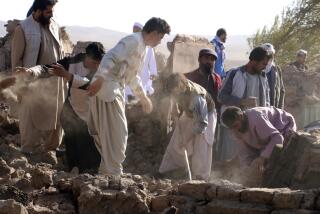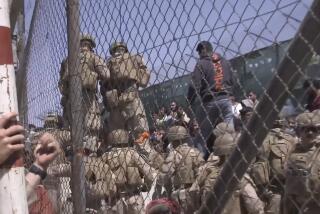Afghanistan Death Toll May Be 50
KABUL, Afghanistan — KABUL, Afghanistan -- Dozens of Afghan civilians who were reported killed during U.S. airstrikes included friends of President Hamid Karzai, and they appear to have been caught in the middle of an extensive sweep in a brewing trouble spot, Afghan and American officials said Tuesday.
Local Afghan officials reported that as many as 50 people may have been killed and 150 injured in the predawn operation Monday in which a U.S. gunship responded to perceived antiaircraft fire by strafing targets strewn across several miles.
Details remain murky, but Pentagon officials on Tuesday outlined a larger operation than previously depicted, involving as many as 400 coalition troops on the ground and American bombers dropping satellite-guided munitions on nearby cave complexes.
Officials would not say what prompted the operation, but they indicated that intelligence information led them to return to a region considered a potential haven for Al Qaeda and Taliban operatives, perhaps including ousted Taliban leader Mullah Mohammed Omar.
“This is an area that is known to have in the past been the home of Taliban and Al Qaeda,” said Marine Gen. Peter Pace, vice chairman of the Joint Chiefs of Staff. “We had intelligence that indicated it would be worthwhile to go back and revisit.”
The attack, in a remote area of central Afghanistan, was under investigation Tuesday by a group of Afghan and American officials. It was the first time that Afghanistan’s new transitional government has had to deal with such a difficult situation involving diplomatic allies, and it was personally painful for Karzai.
Karzai is from Oruzgan province, where the bombing took place.
The attack occurred near the area to which he returned last fall to marshal the anti-Taliban forces that ultimately took the city of Kandahar.
“Some of those who died are family members of those who fought alongside Hamid Karzai against the Taliban,” said Tayeb Jawed, chief of staff to Karzai. “The president knew personally some of those who were killed; it has been a very hard couple of days.”
Much of the information first released by the Pentagon was being revised Tuesday, and many aspects of the attack remained obscure.
It was unclear whether some of those killed and injured were attending a wedding.
Afghan officials have suggested that shots that were fired to celebrate a marriage may have been mistaken by U.S. forces as antiaircraft fire. U.S. military officials have expressed skepticism about that scenario but have not ruled it out.
U.S. Defense Secretary Donald H. Rumsfeld voiced his regrets but said that such mistakes are inevitable. “The task for all of us is to see that it is as limited as possible,” he said.
Local Afghan officials told Karzai that four villages had been attacked, information that was initially corroborated by U.S. military officials when they briefed Karzai, Tayeb said.
The reported number of dead in two of the villages totaled eight, and in a third village about 40 people may have died. But those numbers are unconfirmed, and it is unknown if any casualties occurred in the fourth village.
In addition to the dead, there were about 150 injured, according to estimates by local officials, Tayeb said.
Karzai did not speak publicly, but Foreign Minister Abdullah read a statement from the government that urged the coalition forces to “take all necessary precautions to make sure they do not harm innocent victims.”
In a meeting with U.S. commanders, Karzai “strongly advised coalition forces to seriously assess situations and verify all intelligence reports before taking action,” Abdullah said.
Pace said the attack unfolded in an area where U.S. planes have repeatedly come under antiaircraft fire in recent days. Coalition ground forces--mainly Afghan soldiers accompanied by U.S. troops--were traveling in two groups, with an AC-130 gunship providing cover.
The plane encountered fire from several locations and unleashed heavy cannon fire on at least six targets described by air crew and ground spotters as enemy antiaircraft installations, officials said.
No U.S. planes were hit, Pace said, and there was no exchange of fire among troops on the ground.
The only casualties the Pentagon confirmed were four injured children, whose father brought them to U.S. ground forces in the area after the attack. The children, ages 8 months to 5 years, were taken to the U.S. base at Kandahar.
At the same time as the ground operation, an American B-52 was carrying out strikes on nearby cave complexes, officials said. During that mission, it dropped seven satellite-guided, 1-ton bombs. Ground air controllers reported that six of the bombs hit their targets, and Pace said the seventh hit an unpopulated hill.
If reports from local Afghans are confirmed, the attack would be one of the deadliest for civilians in the 9-month-old war. Some have voiced concern that the incident could strain confidence in America’s conduct of the war. The issue is particularly significant in places like Oruzgan, where Americans rely on sympathetic locals for information about Taliban and Al Qaeda movements.
Since news travels slowly in Afghanistan, American mistakes in one place are often virtually unheard of even in the next province. And the vast majority of Afghans still are grateful to the Americans for helping them get rid of the Taliban and their Al Qaeda guests.
Nevertheless, there is a growing sense of anger over civilian deaths. The frustration is apparent in areas where civilians have been killed and among members of the government, who now want to be consulted before the Americans call in airstrikes or gunships.
Abdullah said he hoped that there would be a careful review by the Americans of every level of the operation. “The whole procedure has to be reviewed,” he said.
Afghan government officials were careful to underscore that they understood the need for hunting down Al Qaeda remnants and accepted that bombing would probably continue.
Rubin reported from Kabul and Miller from Washington.
More to Read
Sign up for Essential California
The most important California stories and recommendations in your inbox every morning.
You may occasionally receive promotional content from the Los Angeles Times.










